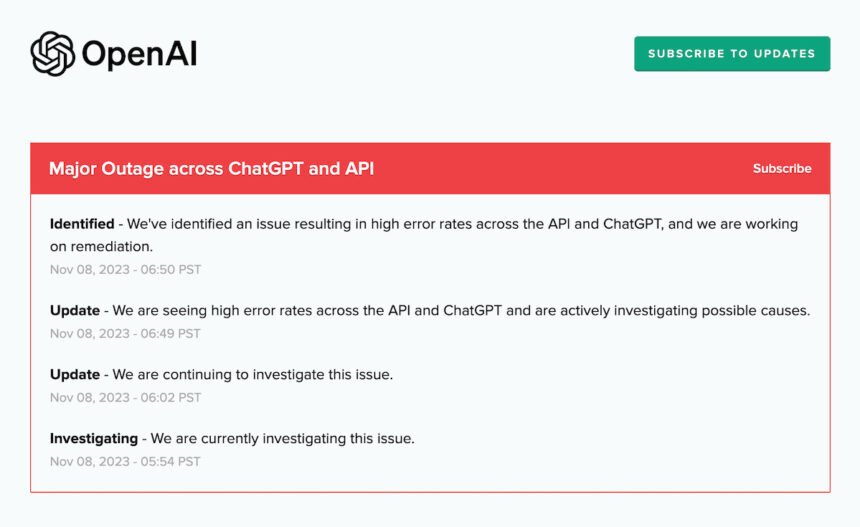In a surprising turn of events, ChatGPT users worldwide found themselves unable to access the popular chatgpt down AI chatbot due to a significant outage. The disruption occurred on Thursday, just hours after OpenAI proudly announced the seamless integration of ChatGPT with iPhone, iPad, and Mac devices. Talk about bad timing! The service went down, leaving millions of users, both free and paid subscribers, scratching their heads and voicing their frustrations.
OpenAI Quick Response
The company didn’t waste time addressing the issue. OpenAI took to X (formerly Twitter) to acknowledge the situation, posting, “We’re experiencing an outage right now. We have identified the issue and are working to roll out a fix. Sorry, and we’ll keep you updated!” True to their word, the team quickly patched the problem, restoring access to ChatGPT within three hours. While users were relieved, the incident marked the second major outage for OpenAI in just over a month—the last one occurring in early November.
Coincidence or Connection?
Interestingly, the ChatGPT outage coincided with service interruptions for Meta’s WhatsApp and Facebook platforms. While there’s no evidence to suggest a connection, the timing raised eyebrows among tech enthusiasts. Could it be a case of bad luck, or is there more to the story? For now, the exact cause of the ChatGPT down incident remains unclear as OpenAI has yet to provide detailed insights.
How Long Was ChatGPT Down?
For nearly three hours, users around the globe were unable to access ChatGPT through its web interface or app. This left millions, including those who pay $20 per month for a Plus membership or $200 annually for Pro, feeling shortchanged. Social media platforms buzzed with complaints, questions, and memes, with many asking, “Why is ChatGPT not working?”
Why Do Outages Happen?
Digital services, no matter how advanced, are not immune to occasional disruptions. Outages like the one affecting ChatGPT can stem from various causes, including:
- Technical Glitches: Software bugs, unexpected hardware failures, or network congestion can bring down even the most robust systems.
- Human Errors: Coding mistakes or missteps during system updates can unintentionally lead to downtime.
- External Factors: Cyberattacks, natural disasters, or power outages can wreak havoc on digital infrastructures.
As online ecosystems grow more complex and interconnected, the challenge of ensuring uninterrupted service becomes tougher. No matter how meticulous the planning, unforeseen hiccups are almost inevitable.
The Impact on Users
The ChatGPT down incident highlighted how dependent people have become on AI tools for everything from casual queries to professional tasks. For businesses relying on ChatGPT AI to streamline operations or enhance customer interactions, the outage was more than an inconvenience—it disrupted workflows and dented productivity. Paid users, in particular, expressed frustration, questioning the value of their subscriptions when such disruptions occur.
Lessons for OpenAI and Others
If there’s one takeaway from this event, it’s the importance of transparency and preparedness. OpenAI’s prompt acknowledgment of the outage and rapid response helped mitigate some user dissatisfaction. However, to maintain trust and loyalty, tech companies must:
- Communicate Clearly: Keep users informed in real-time about outages and progress toward resolutions.
- Invest in Resilience: Implement robust systems that can minimize the risk and impact of disruptions.
- Offer Compensation: Consider extending benefits, such as free service days, to paid users affected by downtime.
A Broader Perspective
It’s not just ChatGPT or OpenAI; outages are a universal challenge for tech companies. Whether it’s Google, Amazon, or Meta, even the biggest names face occasional service hiccups. The key lies in how swiftly and effectively they address these issues while learning from them to prevent future occurrences.
What Can Users Do During an Outage?
When your favorite AI tool goes offline, it’s easy to feel stuck. Here are some tips to stay productive:
- Explore Alternatives: Use other AI chatbots or tools to bridge the gap temporarily.
- Switch to Manual Methods: For essential tasks, rely on traditional methods or other software solutions.
- Stay Informed: Follow official channels like OpenAI’s X account for updates.
The Future of ChatGPT and AI Reliability
As AI continues to weave itself into the fabric of our daily lives, reliability will become a non-negotiable expectation. Companies like OpenAI are likely to double down on building more resilient infrastructures and improving user communication. After all, with great power (or in this case, great AI) comes great responsibility.
Read More: Drones Over New Jersey: The Growing Mystery Unveiled
Conclusion
The ChatGPT down incident serves as a reminder of both the immense potential and the inherent vulnerabilities of AI-driven services. While OpenAI’s quick response deserves credit, users—especially paying ones—hope for fewer disruptions in the future. As the tech world evolves, balancing innovation with reliability will remain the ultimate challenge.
In the meantime, let’s not forget to cut these tech giants some slack. After all, even AI needs a break now and then, right?










